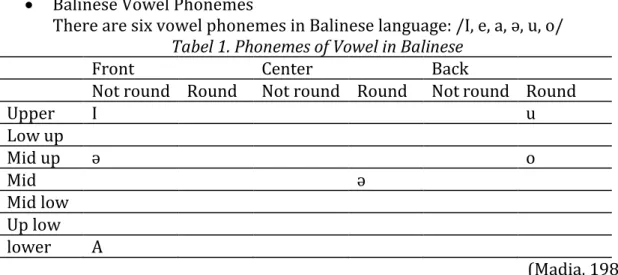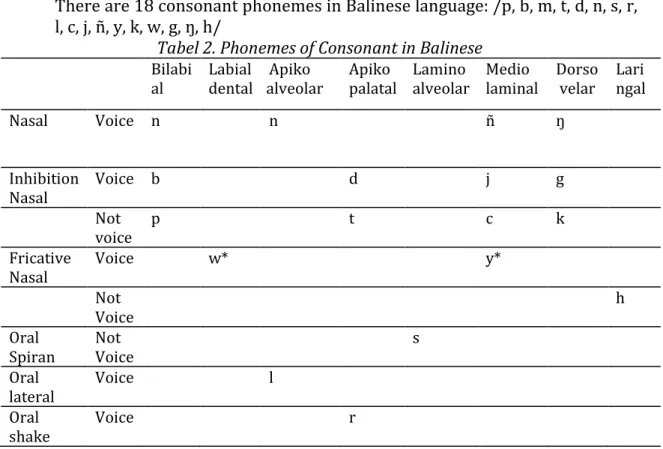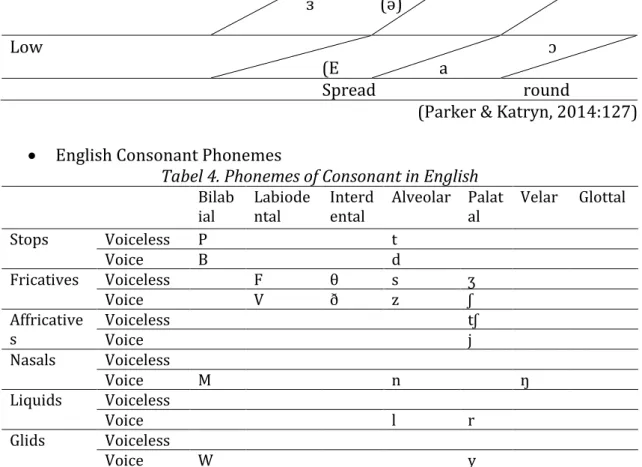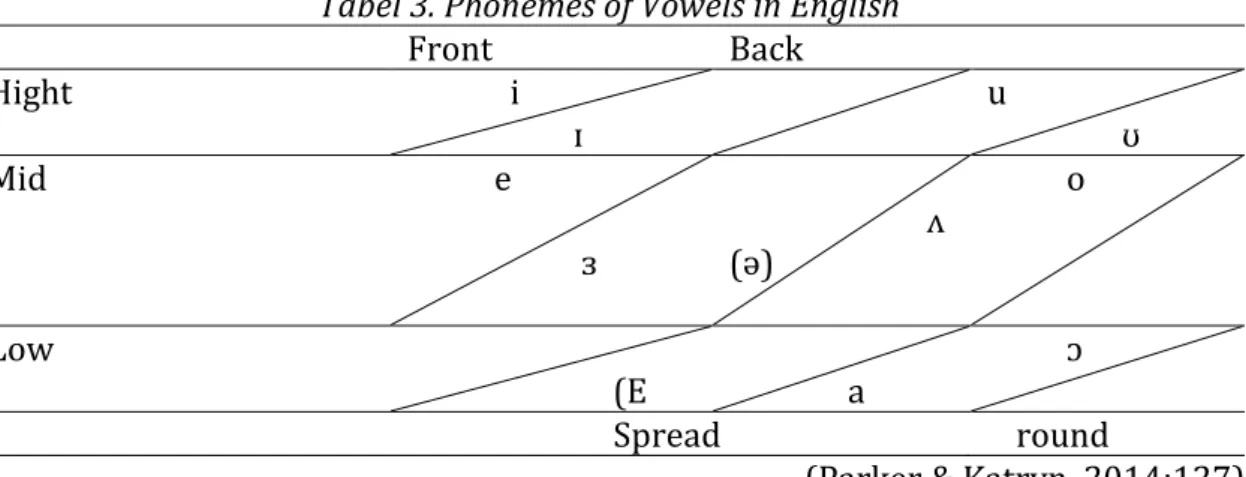The manifestation of hegemonic masculinity in the characters of Santa Monica Studio's God of War (2018). This research titled "The Manifestation of Hegemonic Masculinity in The Characters of Santa Monica Studio's God of War (2018)" aims to find out how hegemonic masculinity is manifested in the characters of the video game God of War (2018). These different degrees of hegemonic masculinity can be seen in the video game titled God of War (2018) by Santa Monica Studio.
What distinguishes this research from the previous studies is that this research focuses on how hegemonic masculinity is expressed in the characters of the video. The traits of hegemonic masculinity are present in God of War's protagonist, Kratos, as seen in the introduction. One of the characters in the game that fits into this category is Sindri, the dwarf blacksmith.

Balinese Phonological Interference in English Pronunciation by Denpasar People
Phonemes in English
The only diphthong /eɪ/ pronounced /ei/ found in the above data is in the word "gain". Other words that have the letter "r" in the middle of some words will also be pronounced clearly, for example in: first, yesterday, sharp and natural. Bilingualism, which results in language contact in speech, is a source of disruption as experienced by people in Denpasar who work in the hospitality industry.
Working in the hospitality field emphasizes the mastery of English as an international language, so it makes people compete to be able to understand and speak English even if it is just daily conversation. Based on the data and results of this study, the researcher suggests that in the future there will be other researchers who will review cases like this more broadly. Indonesian language interference in the use of English discourse writing students at SMPBI 1 Jetis Ponorogo.
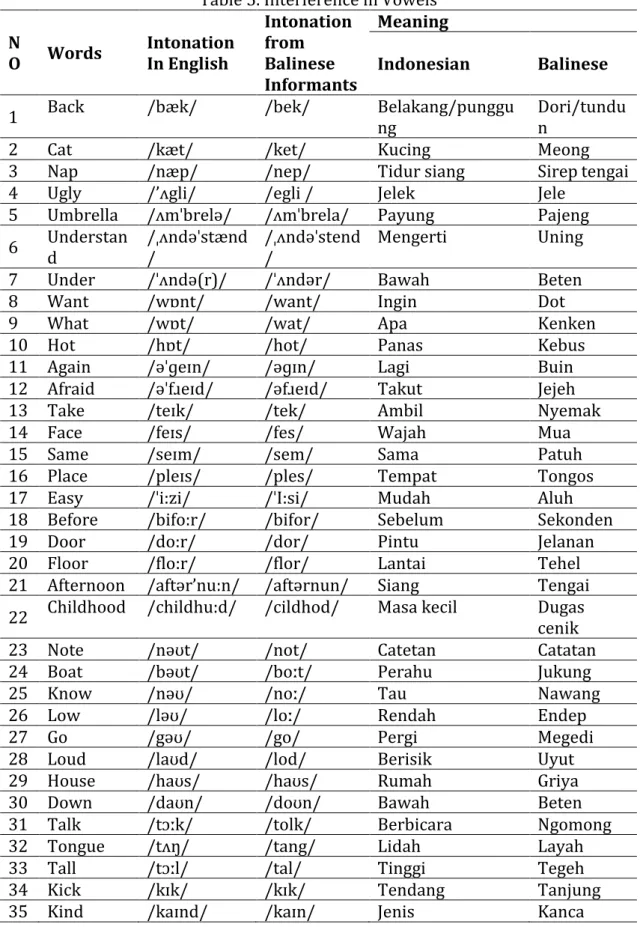
Southeast Asian Literature in English: Gender and Political Issues in Laotian, Burmese and
He also wrote several notable short stories in the 1990s, among which A Bar at the Edge of the Cemetery is a political one. In A Bar at the Edge of The Cemetery he describes the dangers of public apathy in the face of corruption and political oppression. A middle-aged woman revealed the situation to a narrator that most of the illegal bars were closed because owners refused free liquor to the government officials.
A citizen can be evicted from the land whenever government officials want the land for themselves. The short story reveals the hard truth of the communist government, which does not guarantee social and economic equality to its citizens. The writer (Nhat Tien) criticized the government's monopolization of the market by establishing an illegal market.
This young girl character was the victim of the re-education camps without any compensation from the state. In comparison between Laotian short story A Bar at the Edge of the Cemetery and Vietnamese short story The Khaki Coat, these two writers criticized their socialist governments. At the end of the story, even she was hesitant with Damdy's approach, but she did not reject him outright.
This teaching methodology aims to see how the students can relate the information about each country's political and social background to its short stories. In political matters, the Laotian short story A Bar at the Edge of Cemetery represented the government's exploitation of the civilian. Under socialist political ideology, the citizen was expected to be the primary consideration of the state.
In contrast, in the Vietnamese short story The Khaki Coat, a socialist government has banned its citizens from trading due to the government's monopolization of the market.
An Analysis of the Flouting of Conversational Maxims by Grice on ‘A Clean, Well-Lighted
First, the maxim of quality is about how much information is given by the interlocutors. The following example, taken from the exchange between Polonius and Hamlet, will show a disregard for the maxim of quantity. Ignoring the maxim of relevance can be seen in the speaker's statement being irrelevant to the conversation.
The following example will show the disregard of the maxim of the wise in terms of orderliness. Disregarding the rule of relevance is done to talk about another topic and to refuse to discuss certain things. The study shows that Greek implicature can be used in Yemenite dialect of Arabic and the obfuscation is frequently found in the maxim of quantity.
In the short story, there are 11 or 40.74% data that point to ignoring the maxim of relevance. So the maxim of relevance is usually flouted by the older waiter, as he doesn't want to talk about being old and lonely, which becomes the main theme of the story. The maxim of quantity is flouted by the speaker by making an uncommunicative contribution to the conversation.
The speaker violates the maxim of quantity by giving too little or too much information than is necessary. The elderly servant gives too much information about the old man, showing that he flouts the maxim of quantity. The speaker violates the quality maxim because the junior servant shares false information (a lie).
In short, the negation of the maxim of quality is used by speakers to maintain the flow of the conversation and avoid conflicts in the conversation.
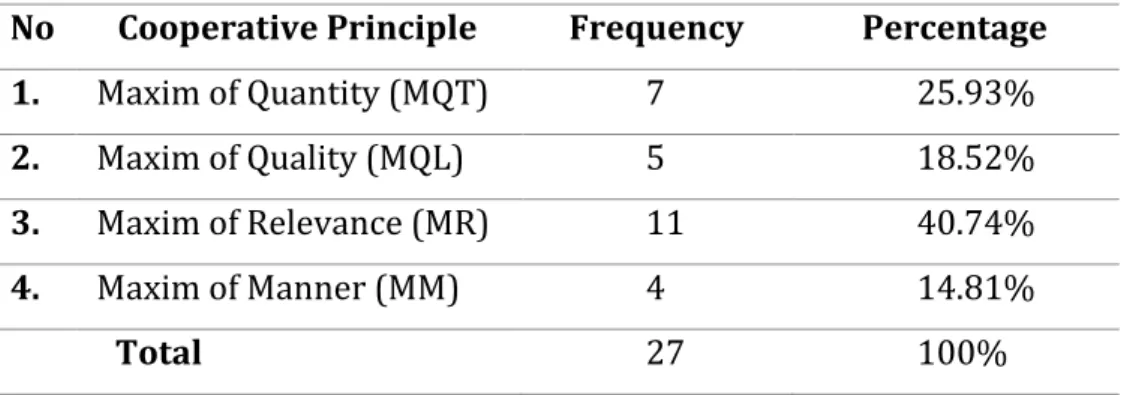
Mental Illness as The Other and Hope in
Selected Lyrics by TOMORROW X TOGETHER
The persona also asserts himself as a loser which gives an illustration of how he is a. The lyrics of the songs convey the intensity of the persona's depressive episode, to the point where he considers himself the Other. The persona declares his life to be "like a war" and how he is always "the loser".
The persona also mentioned the word cliff along with the line "your light guides me". As discussed earlier, the persona in the songs has depressive episodes where he sees life as not worth living. However, the persona feels overwhelmed with fear when contemplating death, even though he has suicidal thoughts in the first place.
The line "my clumsy flight" illustrates how the person is constantly losing the battle to end their life. Although the person appears to have active suicidal ideation, they are still terrified of the idea of death. The words "crazy" in the line show chaos as the person is filled with all kinds of emotions.
In Anti-Romantic, the theme of fear is evident when the character struggles to romanticize their life. In the second verse, the fear is seen again when the persona has thoughts of being self-destructive. Hence, the persona fears that he will not make it to heaven if he chooses to end his life.
You” in this bridge refers to the angel of death mentioned earlier because of the angel; it makes the persona realize that it is so.
Authorial Pronoun We: Capturing Politeness in EFL Academic Writing
Considering the possibility to extend the discussion and the gap in the previous studies on EFL writers' use of authorial pronoun we, the present study aims to reveal the functions and semantic types of authorial pronouns we are in. This study uses quantitative and qualitative corpora - based analysis of first person pronoun, we use AntConc (Anthony, 2011). To find the authorized pronoun we in the data, we performed a Key Word in Context (KWIC) search to find the frequency.
Based on the analysis, the first-person pronoun mi appears as an authorial pronoun more than twice as often as a non-authorial pronoun. A qualitative analysis of the contexts surrounding the occurrence of the authorial pronoun mi gives us insight into its role in five discourse functions, including the assumption of common ground (2a), guidance (2b), review of previous studies (2c), generalization (2d). , procedure (2e), confirmation (2f), claim (2g). These functions then become the basis for determining whether the pronoun we belongs to one of three semantic categories, inclusive, exclusive, and ambiguous.
If the pronoun we has the possibility of the divergence, we categorize it as ambiguous, for example Extract 2a, in which the pronoun we is used by the authors to assume that it is shared. The pronoun we in the sentence "as we know" could be seen from inclusive and exclusive in the co-authored texts. On the other hand, if the divergence process is impossible, we categorized them based on their characteristic of use, regardless of whether pronouns we refer to the authors and readers (inclusive) or only the authors (exclusive).
As we can see in Fragment 2g, the pronoun we can be seen from both inclusive and exclusive points of view. Although the occurrence is less than half of the ambiguous type, these findings reinforce the findings of previous studies on the importance of inclusive pronoun we in research article. We have identified seven functions of the pronoun we and divided them into three semantic types: inclusive, exclusive, and ambiguous.
We also argued that the general choice of pronouns we used by EFL authors could be discerned as a courtesy strategy to soften the potential free trade agreement.

Negative Politeness Strategies Used by American Girl in TV Series Emily in Paris
The speaker can use a negative politeness strategy by showing respect, apologizing, questioning and reassurance (Brown and Levinson 1987). The results showed that negative politeness strategies are the most used strategies by the protagonists. The results showed that the negative politeness strategy is the most used in the film.
What are the social factors that influence the negative politeness strategy Emily uses in the series? The negative politeness strategy is used to respect social distancing and acknowledge status differences. Deciding which politeness strategy to use can be deduced from the topic of the speaker and the hearer.
The other factor that influences the choice of the right politeness strategy is the speaker's and listener's reasons for communicating or talking to each other. Negative politeness strategies across cultures between America and Paris are reflected in the TV series Emily in Paris. This is a negative politeness strategy based on avoidance to save the negative face of the listener.
Emily uses questioning and hedging as negative politeness strategies because the participants are involved in the conversation. Negative politeness found in the TV series Emily in Paris reflects cross-cultural negative politeness strategies between the American people and France. It shows that five out of ten types of negative politeness strategies are found in the TV series: Emily in Paris.
Emily manages to use negative politeness by addressing her boss as "Monsieur," the title for French man in formal instead of "Mr.", and using an apology strategy when using English in front of the audience, because not everyone in her new office speaks English.





